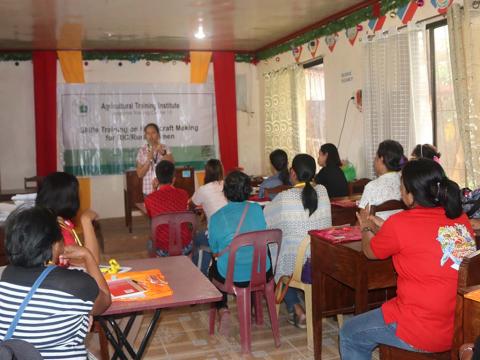Fevarsilia Macabanding, the resource person on handicraft making training teaches participants on the basic steps in making accessories.
SAN MIGUEL, Surigao del Sur- The Skills Training on Handicraft Making for Rural Improvement Club (RIC) members and Rural Women was successfully conducted on July 24-26, 2019.
Said training aimed at enhancing the knowledge and skills of the participants on handicraft and accessory making. This was joined by thirty (30) women from different barangays of San Miguel, Surigao del Sur.
On behalf of the Municipal Agriculture Office (MAO), Ms. Janeth Curada, Agricultural Technologist welcomed everyone during the opening program on the first day of training. She inspired participants to venture into business by making accessories and other available handicrafts as additional livelihood for them and the whole community.
Mr. Jason Paul Dads E. Jampac presented the overview of the training specifically on the related activities to be conducted for three days.
On the other hand, Mary Grace Salve, ATI staff encouraged participants in expressing their feelings towards the Training Course, Training Management Staff (TMS), Resource Person, and Co-participants during the Levelling of Expectations.
Moreover, participants were able to make a set of accessories such as necklace, bracelet, ring and pair of earrings as their outputs for the whole duration of the training with the guidance of the Resource Person Fevarsilia Macabanding. They presented their outputs during the closing program and for those who made it beautifully and full of elegance received an award as token for their masterpiece.
As Project Officer, Mr. Jampac led the Training Management Staff (TMS) of the Agricultural Training Institute-Regional Training Center (ATI-RTC) 13. This is in cooperation with the Rural-Based Organization (RBO) Coordinator from the MAO of San Miguel.
The success of the activity is a result of the strong linkage between the Institute and the Local Government Unit (LGU) of San Miguel, Surigao del Sur. This training is funded under the Gender and Development (GAD) Program of the Institute.

